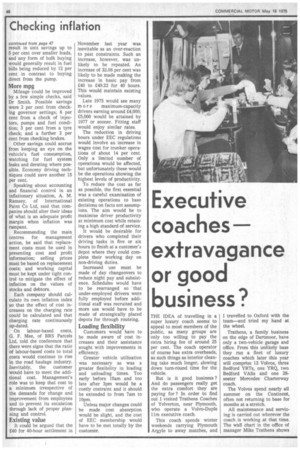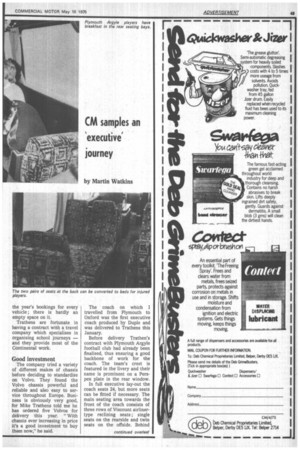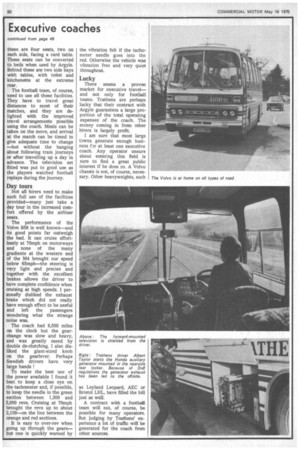Executive coaches extravagance or good business?
Page 50

Page 51

Page 52

If you've noticed an error in this article please click here to report it so we can fix it.
THE IDEA of travelling in a super luxury coach seems to appeal to most members of the public, as many groups are only too willing to pay the extra hiring fee of around 25 per cent. The coach operator of course has extra overheads, as such things as interior cleaning take much longer, slowing down turn-round time for the vehicle.
But is it good business ? And do passengers really get the extra comfort they are paying for ? In order to find out I visited Trathens Coaches of Yelverton, near Plymouth, who operate a Volvo-Duple I Im executive coach.
This coach spends winter weekends carrying Plymouth Argyle to away matches, and I travelled to Oxford with the team—and tried my hand at the wheel.
Trathens, a family business on the edge of Dartmoor, have only a two-vehicle garage and office. From this unlikely base they run a fleet of luxury coaches which later this year will comprise 13 Volvos, three Bedford YRTs, one YRQ, two Bedford VASs and one 28seater Mercedes Charterway coach.
The Volvos spend nearly all summer on the Continent, often not returning to base for months at a stretch.
All maintenance and servicing is carried out wherever the coach is working at that time. The wall chart in the office of manager Mike Trathens shows the year's bookings for every vehicle ; there is hardly an empty space on it.
Trathens are fortunate in having a contract with a travel company which specialises in organising school journeys — and they provide most of the Continental work.
Good investment
The company tried a variety of different makes of chassis before deciding to standardise on Volvo. They found the Volvo chassis powerful and reliable and also easy to service throughout Europe. Business is obviously very good, for Mike Trathens told me he has ordered five Volvos for delivery this year. "With chassis ever increasing in price it's a good investment to buy them now," he said. The coach on which I travelled from Plymouth to Oxford was the first executive coach produced by Duple and was delivered to Trathens this January.
Before delivery Trathen's contract with Plymouth Argyle football club had already been finalised, thus ensuring a good backbone of work for the coach. The team's crest is featured in the livery and their name is prominent on a Perspex plate in the rear window.
In full executive lay-out the coach seats 24, but more seats can be fitted if necessary. The main seating area towards the front of the coach consists of three rows of Viscount airlinertype reclining seats ; single seats on the rearside and twin seats on the offside. Behind these are four seats, two on each side, facing a card table. These seats can be converted to beds when used by Argyle. Behind these are two side bays with tables, with toilet and kitchenette at the extreme rear.
The football team, of course, need to use all these facilities. They have to travel great distances to most of their matches, and they are delighted with the improved travel arrangements possible using the coach. Meals can be taken on the move, and arrival at the match can be timed to give adequate time to change —but without the hanging about following train journeys or after travelling up a day in advance. The television set fitted was put to good use as the players watched football replays during the journey.
Day tours
Not all hirers need to make such full use of the facilities provided—many just take a day tour in the increased comfort offered by the airliner seats.
The performance of the Volvo B58 is well known—and its good points far outweigh the bad. It can cruise effortlessly at 70mph on motorways and none of the many gradients at the western end of the M4 brought our speed below 65mph—the steering is very light and precise and together with the excellent brakes allows the driver to have complete confidence when oruising at high speed's. I personally disliked the exhaust brake which did not really have enough effect to be useful and left the passengers wondering what the strange noise was.
The coach had 8,500 miles on the clock but the gearchange was slow and heavy, and was greatly eased by double de-clutching. I also disliked the giant-sized knob on the gearlever. Perhaps Swedish drivers have very large hands !
To make the best use of the power available I found it best to keep a close eye on the tachometer and, if possible, to keep the needle in the green section between 1,300 and 2,000 revs. Cruising at 70mph brought the revs up to about 2,150—on the line between the orange and red sections.
It is easy to over-rev when going up through the gears— but one is quickly warned by the vibration felt if the tachometer needle goes into the red. Otherwise the vehicle was vibration free and very quiet throughout.
Lucky
There seems a proven market for executive travel— and not only for football teams. Trathens are perhaps lucky that their contract with Argyle guarantees a large proportion of the total operating expenses of the coach. The money coming in from other hirers is largely profit.
I am sure that most large towns generate enough business for at least one executive coach. Any operator unsure about entering this field is sure to find a great public interest if he does so. A Volvo chassis is not, of course, necessary. Other heavyweights, such as Leyland Leopard, AEC or Bristol LHL, have filled the bifl just as well.
A contract with a football team will not, of course, be possible for many operators. But judging by Trathens' experience a lot of traffic will be generated for the coach from other sources.




























































































